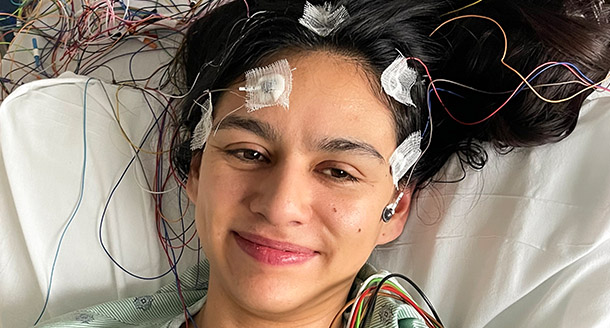A brain tumor diagnosis is life-altering. For the people diagnosed and those who love and care for them, brain tumors can present many challenges and troublesome symptoms that do not need to be endured in silence or managed alone.
Some people may benefit from support that neuro-oncology alone may not address. Examples include:
- An adult with meningioma who is experiencing headaches and difficulty sleeping
- A child who is struggling at school after receiving treatment for a pituitary tumor
- A father whose brain surgery affected his ability to walk
- A mother with glioblastoma who is seeking spiritual guidance
- A family who is struggling with the cost of their child’s treatment for ependymoma
- A caregiver who is seeking help for their own mental health
To address those concerns, ease suffering, and improve quality of life, people impacted by brain tumors and their loved ones may benefit from palliative care.
What is palliative care?
Palliative care is specialized medical care for people with serious illnesses, such as brain tumors, to improve their quality of life. Often used in addition to curative care like chemotherapy and radiation, palliative care holistically supports the whole person — not just their diagnosis — as well as their care partners.
It focuses on relieving the physical, psychological, social, and spiritual concerns, troublesome symptoms, and suffering that people with life-changing diagnoses may experience. Palliative care is for people of every age and stage of their disease, from diagnosis to the end of life.
Hospice care is a type of palliative care that brings comfort and relief to people with life-limiting illnesses who have decided to stop curative treatments. Also known as end-of-life care, hospice care supports people in the final months, weeks, days, and moments of their lives to ease their suffering, respect their wishes, and ensure their dignity in experiencing a good death. Even after a person dies, hospice care also offers bereavement support and grief counseling for their family.
Both palliative and hospice care offer the help of a multidisciplinary team of specialists dedicated to caring for the whole person. That team can include doctors, nurses, pharmacists, physical therapists, occupational therapists, speech language pathologists, dietitians, psychologists, social workers, chaplains, and other professionals who uniquely serve each person’s needs.
How can palliative care support people who have been diagnosed with a brain tumor?
People diagnosed with brain tumors may experience a host of physical, cognitive, behavioral, emotional, relational, financial, and spiritual concerns that can negatively impact their quality of life. A brain tumor diagnosis, the specific location of a brain tumor, and the treatment for a brain tumor all have the potential to cause troublesome symptoms and side effects.
For example, patients and long-term survivors may experience nausea, headaches, pain, changes in mobility, falls, fatigue, depression, anxiety, trouble with memory, and other physical and psychological effects. They may face a lost sense of identity, changes in interpersonal roles and relationships, concerns about finances, spiritual crisis, and a search for meaning amidst their diagnosis. Palliative care can uniquely support them through all of these types of suffering.
Members of the care team can also support people with advance care planning to discuss their needs, values, and wishes for living a good life and help them document their wishes for experiencing a good death.
Is palliative care only used if traditional treatment fails?
Patients can receive the benefits of palliative care at the same time as traditional neuro-oncology care. While neuro-oncologists are uniquely trained to treat brain tumors, palliative care professionals can work alongside them to improve quality of life, decrease symptom burden, and support emotional well-being.
Receiving support from the palliative care team does not mean there is no longer a distinct need for the neuro-oncology team to help, and it does not mean there is no longer hope for the person living with a brain tumor.
Accepting help from palliative care is not giving up but rather speaking up for one’s values and needs and truly being heard.
If there comes a time when curative treatments are discontinued and a person is near the end of their life, hospice care can be provided. Hospice care may not extend one’s quantity of time remaining, but it can ensure that their remaining time is free from unnecessary suffering with the highest quality of life possible.
Is palliative care only for patients?
Palliative care is for all members of the family — not just patients. Family members and caregivers may suffer with their own unique concerns around a loved one’s brain tumor diagnosis. They may struggle with changes in household roles, limitations in their ability to work, financial strain, stress, mental health concerns, anticipatory grief, and challenging family dynamics.
Professionals such as oncology social workers can facilitate family meetings to foster communication about concerns and help resolve conflict between family members. Also, hospice care provides bereavement support for families after their loved ones die.
Where and how can people receive palliative care?
Patients and care partners can access palliative and hospice care in a variety of settings. Patients and their families may receive care in hospitals, nursing homes, outpatient clinics, and even their own homes.
If a person or their loved ones experience any troublesome symptoms, side effects, or concerns, it is imperative to discuss them with their health care team to advocate for their needs. Their provider can then refer them to palliative care for the unique support they need.
Many private health insurance companies cover palliative care services. Coverage from public health insurance programs like Medicare and Medicaid can vary. Patients and caregivers should check with their insurer and health care team to determine insurance coverage and discuss financial concerns.
Where can I find more information?
For more information about palliative care services, CaringInfo, a National Hospice and Palliative Care Organization program, provides guides and resources to help people with serious illnesses make informed decisions. National Brain Tumor Society’s Support Services can help people uniquely impacted by brain tumors. Last, patient advocates and members of a person’s own health care team, such as nurse care managers and social workers, can help navigate concerns and find solutions.





